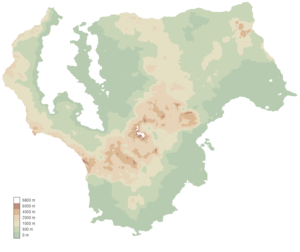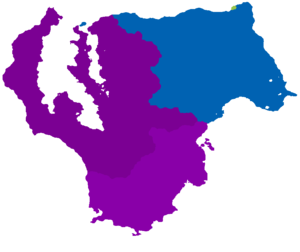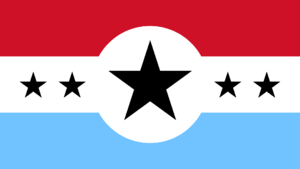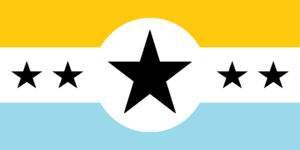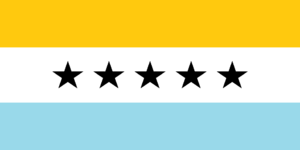Aquaria: Difference between revisions
No edit summary |
No edit summary |
||
| Line 24: | Line 24: | ||
|population = 10.6 million |
|population = 10.6 million |
||
| − | |area = 36,646km |
+ | |area = 36,646km² |
|flagdesc= |
|flagdesc= |
||
|mapdesc= |
|mapdesc= |
||
Revision as of 23:39, 15 July 2021
|
Republic of Aquaria
Akuarioa
|
|||||
|---|---|---|---|---|---|
[[File: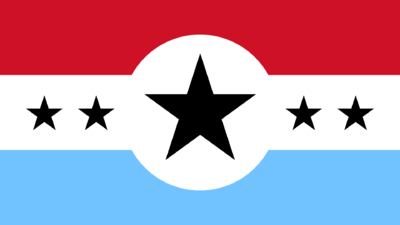 ]] ]] |
|||||
| Motto | “Onwards Together” | ||||
| Common Name | Aquaria | ||||
| Anthem | “Zeoulia Free” | ||||
[[File: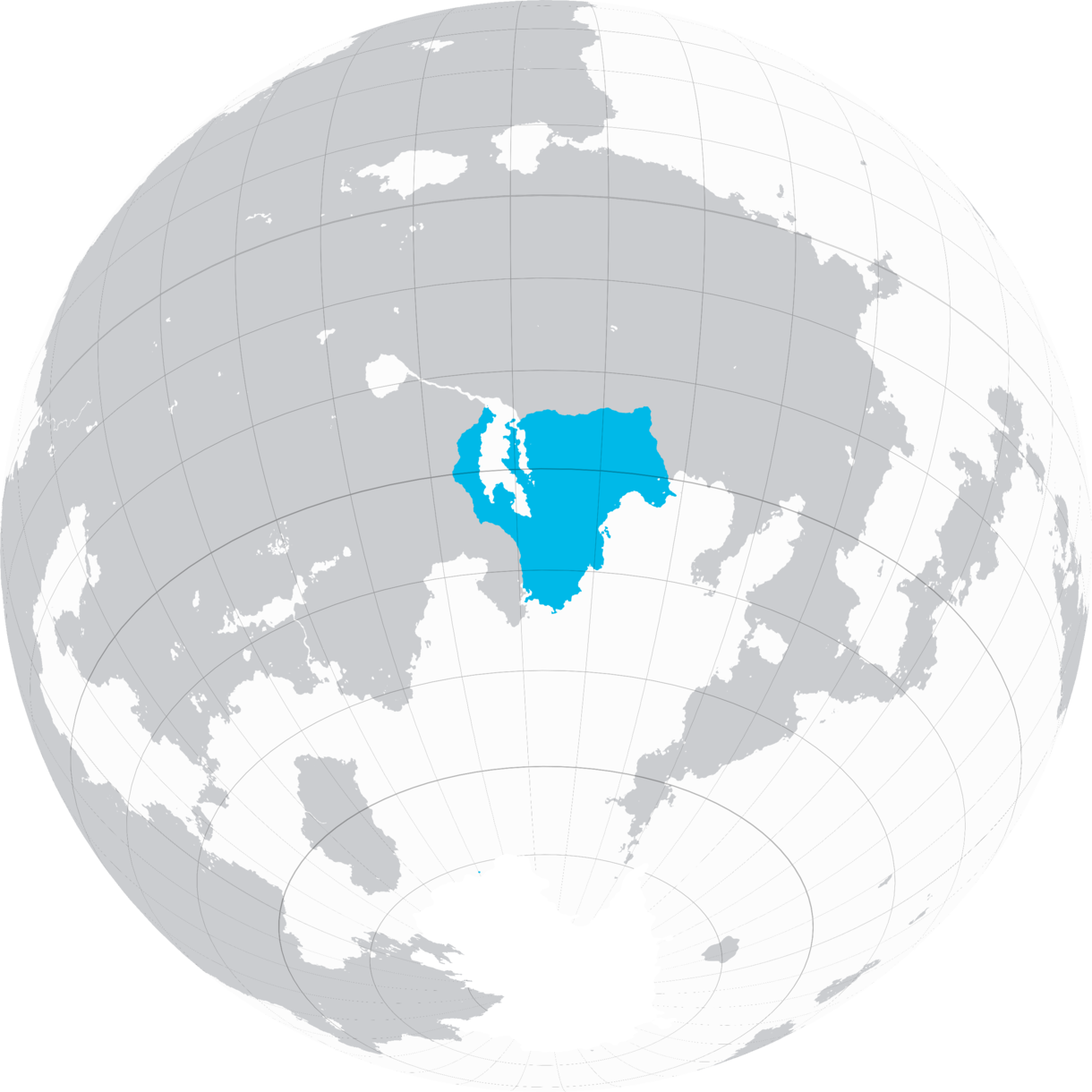 ]] ]] |
|||||
| Demonym | Aquarian | ||||
| Official languages | Zeouli, Sarconian | ||||
| Currency | Aquarian Kerbit | ||||
| Politics | |||||
| Capital | Port Ajemla | ||||
| Government | Federal Parliamentary Republic | ||||
| Foundation | 2050 (current constitution) | ||||
| Preceded by | Zeoul | ||||
| Demography | |||||
| Ethnicities | Baskian 43.9%
Dorvic 24.4% Feguan 0.2% Other 1.5% |
||||
| Population | 10.6 million | ||||
| Area | 36,646km² km² | ||||
Etymology
###
Geography
The Republic of Aquaria is located in southern Doren, on the coast of Greater Baskay Bay. The vast majority of its territory falls between [-] latitude and [-] longitude. With an area of 36,646km^2 at the time of its dissolution, it was the 10th largest nation on Kerbin, ahead of New Grestin and behind the Reciprocity. It was bordered by Hermia to the east and had Owlia lying to the west, with various states of Central Doren on its northern border throughout its history.
Within the Republic, the nation is divided by many natural landmarks. Nomlas, Phaeg, and Onifelge, collectively referred to as the Zeoulian Heartland, are separated from the rest of the nation almost entirely by the southern arm of the Zeuldopines, the world’s largest unbroken mountain range. This natural boundary is often credited with the continued survival of the Zeouli people throughout history, deterring northern invaders from reaching the sea.
To the north, the Great Lakes lie almost entirely within the nation's borders, with its western shore occupied by the province of Dziak. Connected to the Sarconian Sea through a narrow pass, they combine to make up Kerbin's 3rd largest inland body of water by area, and largest by coastline. The lakes are split by Cape Laroc, with the island of Arrataxt by its tip, historically the capital and seat of power in Sarconia in feudal times. In the east, the drier plains of Central Doren extend down into Calyx and Amerb, transitioning into greener fields nearer the coast of Ahcurt and Anidem.
Aquaria also holds jurisdiction over Fish Island, an extremely small detached iceberg off the coast of the South Pole. It’s entire surface is consists of compacted snow and ice, and is almost completely flat. Raised above the sea by sheer cliffs over 30m tall, the island is only accessible by air under normal circumstances.
Climate
###
Biodiversity
###
Urban Areas
###
Politics
Government
Historically each state was an individual, albeit small, country in itself, which would form loose alliances amongst themselves on occasion. In the current area, all have been unified since 2050, when each state came together and united into one nation, putting forth elected politicians to form the Aquarian Council.
Subdivisions
Aquaria is divided into five states; Nomlas, Corain, Amerb, Onifelge, and Artso, with Zeoul being integrated as an autonomous state in 2053. Each state is exactly equal in all rights, with each having its own capital city, and minor council overseeing matters directly related to their own state. Following unification, the cultural and economic lines between states have blurred, as free trade and no internal border control allows large degrees of movement.
Foreign Relations
###
Demographics
Languages
###
Education
###
Religion
###
Age
###
Military
The Aquarian Military is over 3 decades old, mainly being deployed as peacekeeping forces. It has participated in three major military actions, escorting the evacuation of Elysium, the Sarconian counterinsurgency, and fighting alongside Owlia during the Battle of Delsden. It is made up of just under 400,000 personnel.
Air Force
The Aquarian Air Force, or AQAF, is the best funded branch of the Aquarian Military, charged with protecting sovereign airspace and if necessary attaining air superiority over hostile nations. Their white livery, accentuated with deep red fins and wingtips, has become a common sight over every state of Aquaria since unification.
Aircraft Currently In Operation: F-77 Shrike GA-7 Inimicus LAH-3 Wyvern
The Aquarian Navy is comprised of 50 ships currently. It operates 4 different classes of ships.
Ships Currently In Operation: MMC-4H Castellum MHC-11 Arx MAC-4 Calyx S-4 Phantom
Army
The Aquarian Army currently has 150 armoured vehicles in operation, with plans for more designs.
Vehicles Currently In Operation: M51 Corsair APC-94 Mako
Infantry
The Aquarian Marine Corps is outfitted with the latest technologies, with powered exo-suits, handheld railguns capable of firing depleted uranium slugs at 1km/s every 1.2 seconds, a light, concealable 1200rpm SMG, HUD target painting linked to powered gloves for precision aim, and shoulder mounted guided nanomissile launchers.
The Aquarian Space Navy, or AQRN, are a sub-division of the military dedicated to protecting the interests of the Aquarian Space Initiative. It is currently comprised of 36 ships.
Economy
Each state‘s economy has different focuses to take advantage of the geography of the land, with the southern states of Nomlas, Onifelge and Zheoul specialising mainly in fishing, agriculture, and ship construction, while more northernly states like Amerb, Corain and Artso being more industrialised, using the areas higher in resources to set up automated mines and quarries providing materials for large multipurpose factories.
Taxation
To help prevent poverty, products necessary to healthy life, such as high carb foods and foods containing vital minerals, have a lower VAT. To prevent exploitation and potential re-defining of what is eligible for this, all products are reviewed by an indepentent board.
Transport
###
Energy and Infrastructure
The National Power Grid is primarily powered by 6 nuclear reactors, embedded deep within the nations mountains to minimise the effects of fallout if one should fail. Each reactor is networked together with all others and the nation as a whole operates on a single electrical grid. There are other, more localised power stations using many methods of generation, however there is a ban on methods that could potentially expel polluting materials within a certain radius of the sea or the Sarconian Lakes.
Trade
###
Science
###
History
Ancient and Pre-Unification History
During the Stone Age, hunters and fishers had inhabited Aquaria, thriving off the coast and the plentiful hordes of beast roaming the plains. around 20,000 BC, when Kerbals began farming, Hunters began to give up their weapons for farming equipment and took to the Northern lake, and small communities sprang up along its banks, where it provided water to sustain the kerbals and crops. Past the narrow valleys and into the crater, great cities slowly built up, and would come to be the center of Sarconia, one of the two major Super-Regions of Ancient Aquaria. Meanwhile, the Empire of Zeoul established dominance over the south while still in its infancy, and commerce flourished, with Port Ajemla at as a major hub of society and trade, much like now, and a capital cut out of the mountains straddling the coats and the plains that has been in ruin for centuries. Ships would traverse all of Greater Baskay Bay, on months long voyages, and return laden with seafood and exotic goods from across the world.
Notable Events
- Claiming of Zeoul
- Launching of Arc Station
- Attempted Attack on Port Ajemla
- Joining the Joolian Coalition
- Colonisation of Vall
About The Flag
The national flag, representing the union of the five founding states and two major ethnicities, orange for Sarconia and blue for Zeoul. Eventually, the central star would be enlarged to represent Port Ajemla’s increasing position of importance and more the Zeouli-centric ruling group within the nation, and later still as the divide between the two cultures grew the orange would be replaced entirely with Zeoulian red, in a move that for many signified the end of union under its original principles of equality.
